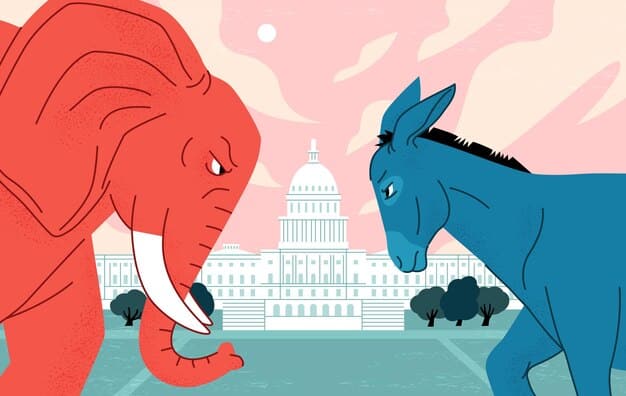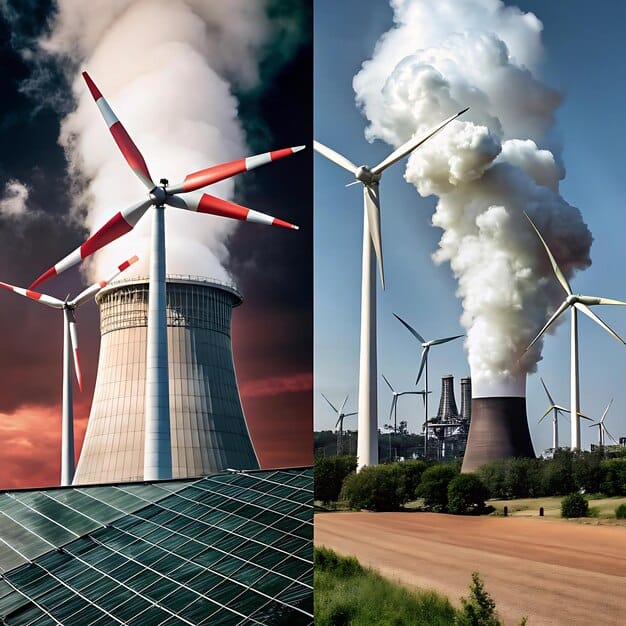Republican vs Democrat: Key Platform Differences in 2025

In 2025, the key differences between the Republican and Democratic Party platforms are expected to center on economic policies, healthcare, climate change, social issues, and foreign policy, reflecting their distinct core values and priorities for the country’s future.
Understanding the **key differences between the Republican and Democratic Party platforms in 2025** is crucial for informed civic engagement. This article breaks down the core policy distinctions.
Republican vs. Democrat: Introduction to 2025 Platforms
As the political landscape evolves, staying informed about the core differences between the Republican and Democratic parties is essential. Understanding their platforms allows voters to make informed decisions and engage in meaningful discussions about the future direction of the country.
In this article, we’ll delve into the anticipated key differences between the Republican and Democratic Party platforms in 2025, covering a range of critical issues from economic policy to social matters.
Economic Policies: Taxation and Spending
Economic policy forms a significant divide between the two parties. Republicans typically advocate for lower taxes and reduced government spending, while Democrats favor progressive taxation and investments in social programs.
Let’s explore the specific approaches each party is likely to take in 2025.
Taxation: Republican Approach
Republicans generally support tax cuts for businesses and individuals, believing this stimulates economic growth. They often argue that lower taxes encourage investment and job creation.
Taxation: Democratic Approach
Democrats usually propose higher taxes on corporations and wealthy individuals to fund public services and reduce income inequality. They believe this promotes a fairer distribution of wealth.
- Republicans often support supply-side economics, focusing on tax cuts and deregulation.
- Democrats favor demand-side economics, emphasizing government spending and social programs.
- The parties also differ on the estate tax, with Republicans often seeking its repeal.
In conclusion, the parties have different views with taxation as one party wants to cut them and the other wants to make them higher.

Healthcare: Access and Affordability
Healthcare remains a contentious issue in American politics. Democrats tend to advocate for universal healthcare and expanded access to coverage, while Republicans often prioritize market-based solutions and individual choice.
The Affordable Care Act (ACA) continues to be a central point of contention between the two parties.
Democratic Perspective on Healthcare
Democrats generally support the ACA and propose measures to strengthen and expand it, such as a public option or Medicare for All.
Republican Perspective on Healthcare
Republicans often seek to repeal or replace the ACA with alternative approaches focused on market competition and state control over healthcare regulations.
- Democrats typically favor government subsidies to make healthcare more affordable.
- Republicans often support health savings accounts (HSAs) and tax credits for individuals.
- The parties also differ on regulations for insurance companies, with Democrats favoring stricter rules.
In short, Republicans lean towards a market-based healthcare system, while Democrats lean towards a public one.
Climate Change and Environmental Policy
Climate change is another area of significant disagreement between Republicans and Democrats. Democrats generally recognize the urgency of addressing climate change and support policies to reduce greenhouse gas emissions.
The role of government in regulating environmental policy is a key point of contention between the two parties.
Democratic Stance on Climate Change
Democrats typically support investments in renewable energy, regulations on fossil fuels, and international agreements to combat climate change, such as the Paris Agreement.
Republican Stance on Climate Change
Republicans often prioritize energy independence and economic growth, sometimes questioning the severity of climate change and opposing regulations that could harm industries.
- Democrats generally support carbon pricing mechanisms, such as a carbon tax or cap-and-trade system.
- Republicans often emphasize technological innovation and voluntary measures to reduce emissions.
- The parties also differ on policies related to fossil fuel development, with Democrats favoring restrictions.
The two parties continue to disagree about climate change with Democrats addressing its urgency and republicans prioritizing energy independence.

Social Issues: Abortion and LGBTQ+ Rights
Social issues such as abortion and LGBTQ+ rights often reflect fundamental value differences between Republicans and Democrats. Democrats generally support abortion rights and LGBTQ+ equality.
The legal and social status of abortion and LGBTQ+ individuals continues to be a source of debate.
Democratic Views on Social Issues
Democrats typically advocate for policies that protect reproductive rights and prevent discrimination based on sexual orientation or gender identity.
Republican Views on Social Issues
Republicans often emphasize religious freedom and traditional family values, leading to policies that restrict abortion access and support conservative social agendas.
- Democrats generally support codifying abortion rights into federal law.
- Republicans often support state-level restrictions on abortion, such as waiting periods or parental consent laws.
- The parties also differ on issues related to transgender rights, with Democrats advocating for inclusive policies.
To summarise, Democrats tend to give high importance to abortion rights and LGBTQ+ equality whereas Republicans tend to back conservative agendas.
Foreign Policy and National Security
Foreign policy and national security are also areas where the Republican and Democratic parties often diverge. Republicans tend to favor a strong military and assertive foreign policy.
The role of the United States in global affairs is a central theme in discussions of foreign policy.
Republican Foreign Policy
Republicans often support increased military spending, interventionist foreign policy, and strong alliances with countries that share U.S. interests.
Democratic Foreign Policy
Democrats typically emphasize diplomacy, international cooperation, and humanitarian aid as tools of foreign policy. They often argue for reduced military spending and a more cautious approach to intervention.
- Republicans generally support maintaining a strong military presence around the world.
- Democrats often prioritize addressing global challenges such as poverty and disease.
- The parties also differ on trade policy, with Republicans often favoring free trade agreements.
To sum up, Republicans want to keep a strong military and Democrats want to emphasise diplomacy.
Education: Funding and Standards
Education policy highlights different priorities for Republicans and Democrats. Democrats emphasize equitable funding and support for public schools. Whereas, Republicans advocate for school choice and local control.
The role of the federal government in education is a recurring theme in policy debates.
Democrats’ View on Education
Democrats typically support increased federal funding for public schools, universal preschool, and measures to reduce student debt.
Republicans’ View on Education
Republicans often advocate for school voucher programs, charter schools, and local control over education standards. They believe this promotes competition and innovation.
- Democrats generally support teacher training and professional development programs.
- Republicans often emphasize accountability measures, such as standardized testing and school ratings.
- The parties also differ on policies related to higher education, with Democrats favoring free tuition at public colleges.
Funding and the value of government can be seen here with Democrats prioritizing public school funding and Republicans advocating for local control.
| Key Area | Brief Description |
|---|---|
| 💰 Taxation | Republicans favor lower taxes; Democrats prefer progressive taxation. |
| 🏥 Healthcare | Democrats want universal access; Republicans prefer market-based solutions. |
| 🌎 Climate | Democrats support regulations; Republicans prioritize energy independence. |
| ⚖️ Social Issues | Democrats advocate for abortion rights and LGBTQ+ equality; Republicans uphold traditional values. |
Frequently Asked Questions
▼
Republicans typically advocate for lower taxes and reduced government spending, while Democrats favor progressive taxation and investments in social programs to reduce income inequality.
▼
Democrats generally support universal healthcare and expanded access, often strengthening the Affordable Care Act. Republicans prioritize market-based solutions and individual choice.
▼
Democrats support investments in renewable energy and regulations on fossil fuels. Republicans prioritize energy independence, sometimes questioning climate change severity.
▼
Democrats advocate for reproductive rights and LGBTQ+ equality. Republicans emphasize religious freedom, supporting conservative social policies and restrictions on abortion access.
▼
Republicans favor a strong military and assertive foreign policy, while Democrats emphasize diplomacy, international cooperation, and humanitarian aid.
Conclusion
Understanding the **key differences between the Republican and Democratic Party platforms in 2025** requires a comprehensive look at their stances on economic policy, healthcare, climate change, social issues, foreign policy, and education. By examining these differences, voters can make more informed decisions.





